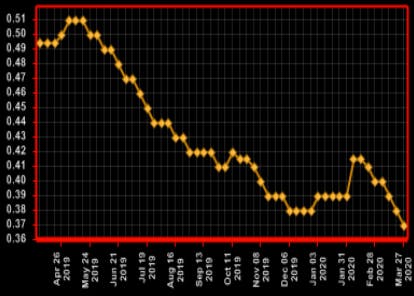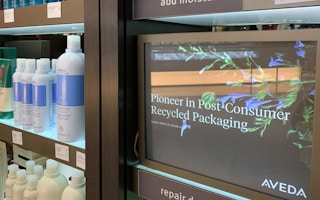While the coronavirus-induced collapse in oil demand might be good news for the climate as greenhouse gas emissions ease, it is not good news for the nascent circular economy in a ubiquitous material made from oil: plastic.
To continue reading, subscribe to Eco‑Business.
There's something for everyone. We offer a range of subscription plans.
- Access our stories and receive our Insights Weekly newsletter with the free EB Member plan.
- Unlock unlimited access to our content and archive with EB Circle.
- Publish your content with EB Premium.
The price of plastic is closely linked to the price of oil, and since the price of plastic has fallen in line with the oil price, the price of recycled plastic is now much higher than virgin plastic, squeezing demand for post-consumer polymers.
Recycled plastic became more expensive than virgin plastic towards the end of last year, driven by growing demand from consumer goods companies to use recycled plastics in their products. But now it makes even more economic sense for manufacturers to use new plastic instead of recycled plastic.
“The last time we saw an oil price shock this big was the global financial crisis in 2008. Then, the volume of plastic recycling in China fell from 4 million tonnes to 1 million tonnes,” said Martyn Tickner, the former chief executive of Bangkok-based plastic producer HMC Polymers, who recently joined a plastic waste reduction firm.

The falling price of virgin plastic, April 2019 - March 2020. Source: The Plastics Exchange
The economic pinch from the covid-19 pandemic has led to recycling plant closures all over the world as demand for recycled material has fallen, Dr Steve Wong, chief executive of Fukutomi Recycling and chairman of China Scrap Plastics Association told Eco-Business.
One bright spot for the plastics industry, according to market place The Plastics Exchange, has been demand for food delivery packaging; governments have loosened restrictions on single-use plastics, which are deemed to be safer for consumers, while retailers have started to ban bring-your-own-container schemes to reduce the risk of the virus spreading.
But that’s not good news for the oceans; 8 million tonnes of plastic waste enters the ocean every year, and the high use of single-use plastic from takeaway meals could exacerbate the marine pollution problem.
Will corporates stay committed?
So has the relatively high price of recycled plastic affected the sustainable packaging commitments of large plastic users such as consumer goods firms? Not for now, it seems.
Unilever, one of the world’s largest packaged goods firms, told Eco-Business that its commitments “remain unchanged”, and the company has “robust plans” to meet its target of increasing the use of recycled plastic in its products to at least 25 per cent by 2025. The company estimates that just 5 per cent of its 2019 plastic footprint was recycled plastic.
Unilever’s competitor, Henkel, is just as confident that the price of recycled plastic will not affect its sustainable packaging ambitions, and it was committed to meet a newly announced target of using 30 per cent recycled plastic in its products by 2025.
Tom Peacock-Nazil, founder of beach clean-up and plastic offsetting firm Seven Clean Seas, said that companies that have made plastic reduction and recycling targets will most likely stick to them, because of the reputational cost of doing otherwise.
“However, we don’t yet know the extent to the global economic slowdown. We might see money shift away from sustainability in hard-hit companies. This would be a disaster if done at scale. But companies need to survive,” he said.














